Related Research Articles

The cinema of Australia began with the 1906 production of The Story of the Kelly Gang, arguably the world's first feature film. Since then, Australian crews have produced many films, a number of which have received international recognition. Many actors and filmmakers with international reputations started their careers in Australian films, and many of these have established lucrative careers in larger film-producing centres such as the United States.

Jedda, released in the UK as Jedda the Uncivilised, is a 1955 Australian film written, produced and directed by Charles Chauvel. His last film, it is notable for being the first to star two Aboriginal actors, Robert Tudawali and Ngarla Kunoth in the leading roles. It was also the first Australian feature film to be shot in colour.

The HOYTS Group of companies in Australia and New Zealand includes HOYTS Cinemas, a cinema chain, and Val Morgan, which sells advertising on cinema screens and digital billboards.

Deborah Jane Mailman is an Australian television and film actress, and singer. Mailman is known for her characters: Kelly Lewis on the Australian drama series The Secret Life of Us, Cherie Butterfield in the Australian comedy-drama series Offspring, Lorraine in the Australian drama series Redfern Now and Aunt Linda in the Australian dystopian science fiction series Cleverman. Mailman portrayed the lead role of MP Alexandra "Alex" Irving on the Australian political drama series Total Control.
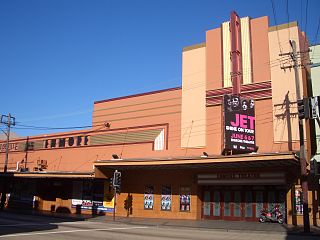
The Enmore Theatre is a theatre and entertainment venue in Enmore, New South Wales, Australia.
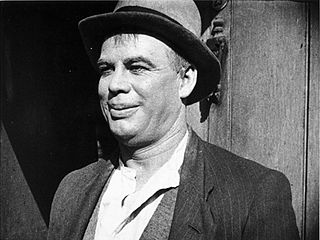
The Sentimental Bloke is a 1918 Australian silent film based on the 1915 verse novel The Songs of a Sentimental Bloke by C. J. Dennis. Produced and directed by Raymond Longford, the film stars Arthur Tauchert, Gilbert Emery, and Lottie Lyell, who also co-wrote the film with Longford.
ACMI, formerly the Australian Centre for the Moving Image, is Australia's national museum of screen culture including film, television, videogames, digital culture and art. ACMI was established in 2002 and is based at Federation Square in Melbourne, Victoria.

The National Film and Sound Archive of Australia (NFSA), known as ScreenSound Australia from 1999 to 2004, is Australia's audiovisual archive, responsible for developing, preserving, maintaining, promoting, and providing access to a national collection of film, television, sound, radio, video games, new media, and related documents and artefacts. The collection ranges from works created in the late nineteenth century when the recorded sound and film industries were in their infancy, to those made in the present day.

The Australian Film Commission (AFC) was an Australian government agency was founded in 1975 with a mandate to promote the creation and distribution of films in Australia as well as to preserve the country's film history. It also had a production arm responsible for production and commissioning of films for the government. It was superseded by Screen Australia from 1 July 2008.
Meryl Tankard is an Australian dancer, choreographer, and filmmaker. She started her career at the Australian Ballet in Sydney in 1975, and was principal dancer with Pina Bausch and her Tanztheater Wuppertal in Germany between 1978 and 1984. In 1989 formed her own dance company in Canberra, the Meryl Tankard Company. In 1992 she was appointed director of the Australian Dance Theatre in Adelaide, South Australia, leaving in 1999 to become a freelance choreographer. Furioso is considered one of her defining works; other well-known works include Two Feet, Furioso, Songs With Mara, and Chants de Marriage 2. Her life partner is photographer and visual artist Regis Lansac, who does the videography for many of her works.
Film Australia was a company established by the Government of Australia to produce films about Australia in 1973. Its predecessors were the Cinema and Photographic Branch (1913–38), the Australian National Film Board, and the Commonwealth Film Unit (1956–72). Film Australia became Film Australia Limited in 1988 and was consolidated into Screen Australia in 2008.
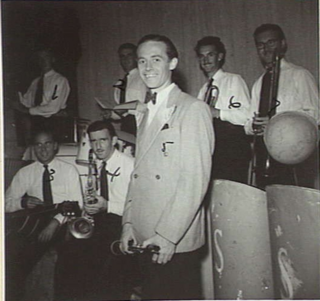
Horace Andrew Dargie was an Australian musician, television compère, talent manager, music label founder and music arranger. As a member of Horrie Dargie Quintet he was awarded the first gold record in Australia for their 10-inch live album, Horrie Dargie Concert (1952), which sold 75,000 copies. In the late 1950s and early 1960s he compèred TV variety programmes Personally Yours (1959), BP Super Show (1959–1962) and The Delo and Daly Show (1963–1964). Dargie co-produced teen pop music programme, The Go!! Show (1964–1967), and as well as organising its on-screen performers he established the related Go!! Records label to provide an outlet for artists' singles. He was inducted into the ARIA Hall of Fame in 1996. Dargie was married twice.
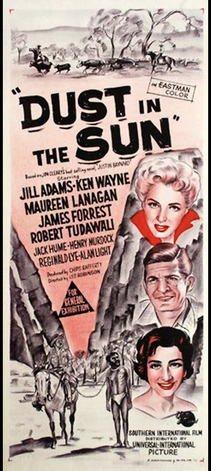
Dust in the Sun is a 1958 Eastmancolor Australian mystery film adapted from the 1955 novel Justin Bayard by Jon Cleary and produced by the team of Lee Robinson and Chips Rafferty. The film stars British actress Jill Adams, Ken Wayne and an Indigenous Australian actor Robert Tudawali as Emu Foot.
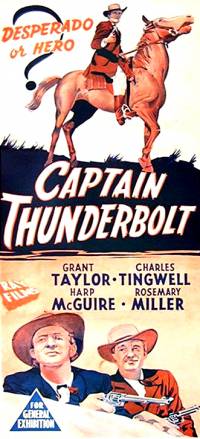
Captain Thunderbolt is a 1953 Australian action film from director Cecil Holmes about the bushranger Captain Thunderbolt. It was one of the few all-Australian films of the 1950s.
Diggers in Blighty is a 1933 Australian film starring and directed by Pat Hanna. Hanna decided to direct this film himself after being unhappy with how F. W. Thring had handled Diggers (1931).

Rock 'n' Roll is a 1959 Australian rock and roll concert film filmed at Sydney Stadium during the Lee Gordon's Rock 'n' Roll Spectacular shows, directed by Lee Robinson. Performers include Johnny O'Keefe, The Delltones, The Devils and Johnny Devlin. All acts are from either Australia or New Zealand. American singer Fabian's performance was also shot, but this was cut from the Australian version of the film as the producers did not wish to pay the fee his management requested. They did, however, discreetly keep the Fabian sequence intact in some versions of the film that were sent to New Zealand.
Ned Kelly is a 1942 radio play by Douglas Stewart about the outlaw Ned Kelly.
This Is Television is a 1960 Australian television documentary which appeared as an episode of The General Motors Hour. It included behind the scenes look at the following:
Raymond Charles Argall is an Australian cinematographer, director, and editor. His feature film Return Home (1990) is regarded by many critics as an Australian cinema classic. Argall served on the board of the Australian Directors Guild for 16 years, holding the position of president from 2006 to 2015 and secretary from 2015 to 2017. In 2016, Argall launched a business restoring archival films through his production company Piccolo Films.
Umbrella Entertainment is a privately-held Australian film production and distribution company that began operating in 2001. It is based in Kew, Victoria.
References
- ↑ "Hoyts Theatres to Show Film of A.B.C.", ABC Weekly, 17 December 1955, retrieved 11 February 2024– via Trove
- ↑ "Impressive films at festival". The Age. 1 June 1955. p. 2.
- ↑ "National TV Makes Flying Start". The Argus . Melbourne. 20 November 1956. p. 3. Retrieved 12 February 2024– via National Library of Australia.
- ↑ "Television Parade". The Australian Women's Weekly . Vol. 24, no. 24. 14 November 1956. p. 26. Retrieved 12 February 2024– via National Library of Australia.